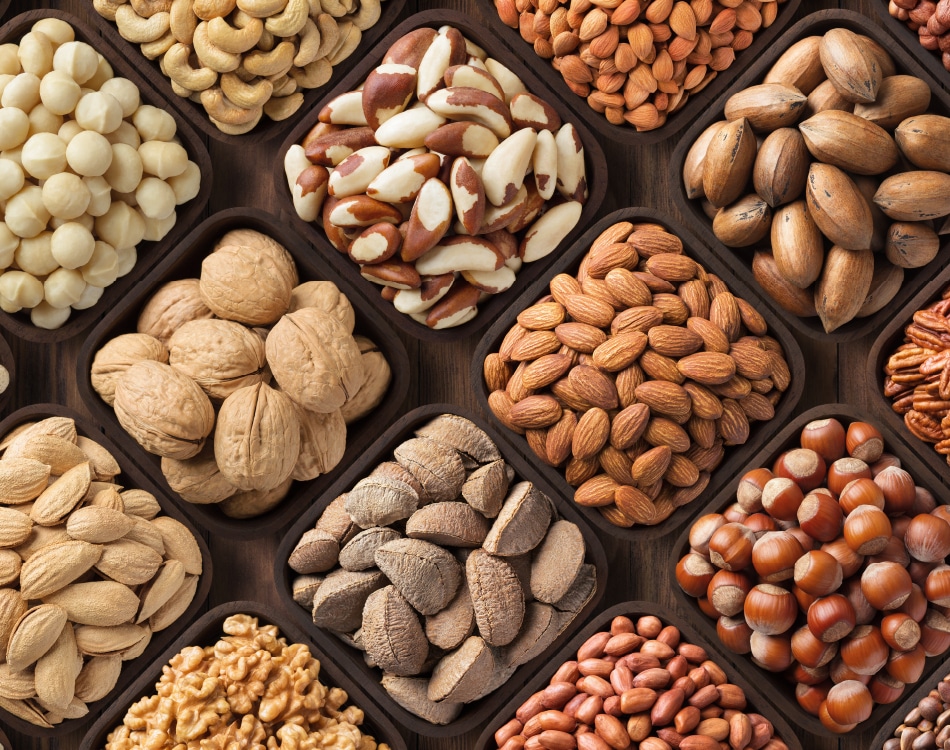Nuts are possibly the most dichotomous health food because they are a natural source of vitamins, minerals and plant protein but are also energy dense with more fat-derived calories than other foods.
So, should you include nuts in your daily diet and, if so, which nuts should you eat?
READ MORE | How To Structure Diet To Eat For Energy Or Strength
The right nut dose
The simple answer is yes, you should include nuts in your daily diet. The key is keeping to the right dose and choosing the best nut variants for your health or physique goals.
A handful of nuts – approximately 28g – contains between 160-200 calories, depending on the nut, with up to 80% derived from fat. As such, that is the recommended daily dose.
READ MORE | Calories And Kilojoules: Know The Difference, It’s Important!
Health and weight-loss benefits from nuts
Despite their calorific nature, a 2019 study found that the more people eat nuts, the leaner they got.
The study tracked the effects of nut consumption on weight gain over the course of 28 months and found that those who frequently consumed nuts gained less weight than those who never ate nuts. They were also 43% less likely to become overweight or obese.
Frequently consuming nuts has also been linked to a reduced risk of major chronic diseases, such as heart and blood vessel disorders and type-II diabetes. Each type of nut also has a different benefit or nutrient that it provides our bodies with.
READ MORE | 4 Ways To Pack In More Protein
Know your nut varieties
However, it is important to choose the right kind of nut to get the greatest health benefit.
While peanuts are the most pervasive type of nut in modern western diets as they are the easiest and cheapest to cultivate in commercialised farming, this calorie-dense ground nut offers fewer health benefits than other types tree nuts.
Various nuts also have a good protein content, which makes them an ideal source of plant protein.
READ MORE | Magnesium May Reduce Irritable Bowel Disease Risk And Symptoms, Suggests Study
Walnuts
Walnuts contain antioxidants that help protect our bodies against cellular damage. Walnuts are also naturally high in omega 3-fatty acids, particularly alpha linolenic acid, which helps to reduce inflammation and rebalance our omega 3:6 ratios.
Walnuts are a good source of fibre, which means they help to promote satiety and aid digestion. As walnuts contain the hormone melatonin they also help to promote healthy sleep. You can also find biotin in walnuts, a vitamin known to strengthen hair, reduce hair loss and improve hair growth.
Macadamia nuts
Macadamia nuts contain 2 g of protein and 21 g of fat per serving. They are also a rich source of omega fatty acid, with a favourable 3:6:9 ratio (skewed towards a greater omega 3 content) and between 78-86% of this nut’s fat content is monounsaturated fat.
In addition, macadamia nuts contain palmitoleic acid, a type of monounsaturated fatty acid that may speed up fat metabolism, thus reducing the body’s ability to store fat.
They also have a very high mineral content, particularly calcium, magnesium, sodium, iron, potassium and phosphorus, and a beneficial vitamin content.
Almonds
Almonds contain the fewest calories (160) per 28g serving but contain the most fibre compared to other nuts. A handful delivers 6 g of protein and 14 g of fat.
Almonds are the richest nut source of alpha-tocopherol, a form of vitamin E that acts as an antioxidant to help manage free radical damage. Almonds contain around 17% of our daily requirement of vitamin B2, which is what helps our bodies convert food to energy. This vitamin also has a positive effect on performance and strength.
Almonds are also rich in calcium, magnesium and potassium, which are all essential for bone health.
Cashew nuts
These nuts are particularly rich in iron and zinc – iron helps deliver oxygen to all of our cells, which prevents anaemia, while zinc is critical to our immune system and eyesight.
Cashew nuts contain healthy monounsaturated fats and are rich in antioxidants. High in copper, these nuts also aid energy production, and improve flexibility in blood vessels, bones and joints.
However, these nuts have a high energy density due to the overall carbohydrate content, with 5 g of protein and 13 g of fat per serving. It is best to consume these nuts in moderation.
Brazil nuts
Just one Brazil nut packs more than 100% of our daily recommended intake of the phytosterol selenium, which plays an important role in the production of specific antioxidants.
Selenium encourages the production of glutathione, another important antioxidant enzyme. As such selenium is well known for fighting free radicals.
These nuts are also particularly rich in palmitoleic acid and oleic acid, and are also a good source of complete protein.
Hazelnuts
These nuts are most notable for their high levels of monounsaturated fats and are a good source for oleic acid.















